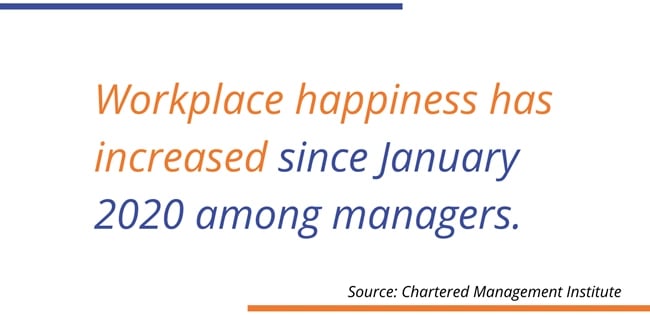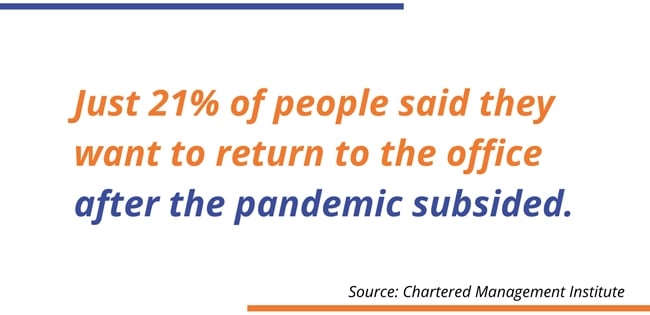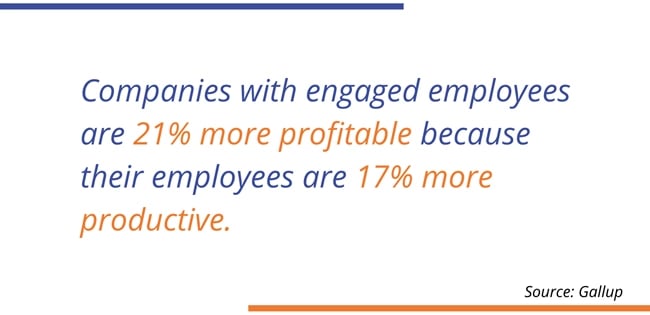How Has The Pandemic Affected Employee Engagement?
As companies plan for the future during the pandemic, they need to remember to keep employee engagement a priority.
COVID-19 has forced organizations to change the way they work. We’ve all grown accustomed to working remotely and using video calls more frequently, but how has it impacted employee engagement and the channels of communication? Interestingly, the pandemic seems to have had a positive impact on the ways in which employees work.
Many Employees Have Been Happier Working During The Pandemic
While there’s no denying that the pandemic has been an extremely worrying time for us all, there has been a surprising outcome in terms of workplace happiness.

The Engaging Works’ Workplace Happiness Survey discovered that workplace happiness has increased across the board since January 2020 among managers, with an overall happiness score of 72 and a job satisfaction score of 73.
One of the reasons for this is that the pandemic forced a major shift in how we work and communicate with colleagues and managers. There has been a greater acceptance of flexible and remote working, which has had a positive effect on our sense of empowerment and job satisfaction.
While it has taken time for many of us to adapt to this new way of working, the positive impact it has had on work-life balance and flexibility has led many to prefer this way of working. In fact, in this same study, just 21% of people said they want to return to working in the office when the pandemic subsides.
This represents people who miss socializing in the office and who don’t like irregular work hours that sometimes result from working remotely.

Despite a majority of people being happier with their jobs when working remotely, you still need to be mindful of employee engagement at your organization. It’s more important now than ever to make sure your employees feel connected to their colleagues even from afar.
How a Business Treats its Staff is a Bigger Issue Than Ever Before
Among the positives for employees as a result of COVID-19 is that it has put an emphasis on how employers treat their staff.
Companies that have gone above and beyond to support their staff are being heralded as shining examples of how businesses should operate, whether it’s transparency from senior leaders, ensuring job security, or putting the safety of employees first.
Employees have always stated how important it is to be treated well in the workplace in terms of job satisfaction and employee engagement, but now, more than ever, businesses need to take notice of how they treat their workforce.
There are many ways for businesses to support their staff and gain their trust and loyalty. Small things like recognizing employees for their work, keeping open communication, and listening to their ideas fuels employee engagement.
There are many reasons for organizations to focus on employee engagement. Companies with engaged employees are 21% more profitable because their employees are 17% more productive, according to a Gallup study. That is a good enough reason to make your employee engagement initiative a priority.

A Greater Focus on Learning
With more time on our hands, the pandemic led to a greater focus on growth and improving the business through learning, training, and strategizing. This has enabled greater opportunities for staff and allows them to feel more engaged.
Employee engagement leads to a deeper connection from the employees towards their place of business. They feel closer to the successes and failures of the business and are more invested in their organization.
“If COVID-19 has created one positive thing for businesses, it’s opportunity”, said Executive Coach, Dominic Monkhouse of Monkhouse & Company. “Companies need to treat this pandemic as an accelerator; the one thing they have been looking for to pivot, re-evaluate or simply get things done. When the going gets tough, attitude trumps everything”.
There are more opportunities than ever for staff to redefine the ‘new normal’ through learning skills that will enable them to work more effectively to gain training in areas that can benefit the business going forward. It can even have a lasting impact on the digital transformation of your company.
 But it’s not just employees that can learn from this experience – businesses that understand how to get the most from remote staff will be able to thrive as we all adapt to a new way of working. One way they can do this successfully is by understanding what staff needs in order to work to their best ability and supporting them.
But it’s not just employees that can learn from this experience – businesses that understand how to get the most from remote staff will be able to thrive as we all adapt to a new way of working. One way they can do this successfully is by understanding what staff needs in order to work to their best ability and supporting them.
A Change in Leadership Culture
One of the ways in which businesses have improved employee engagement throughout this time is by adopting a different leadership style. The businesses that have continued to thrive throughout lockdown and beyond are those that have put a greater focus on internal communication, motivation, and support.
Whether it’s through regular check-ins to help employees feel cared for and encouraged, or prioritizing relationships over profits, businesses can learn a lot about how to work with their team for the future, not just during the pandemic.
COVID-19 has taught us all the importance of working together and communicating effectively. More and more, people are finding ways to help one another and listen more. These skills are important in business and a company that takes care of its people is a company that will succeed.
The positive side effect of this difficult time is that we are all appreciating the importance of these skills and of teamwork more than ever, which has had a great effect on employee engagement and workplace culture, even when working remotely.








